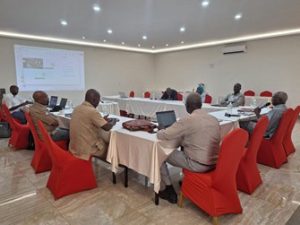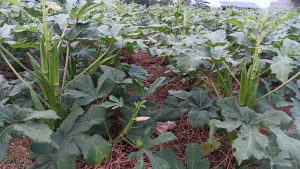TAAT Launches Phase II Activities in Cameroon
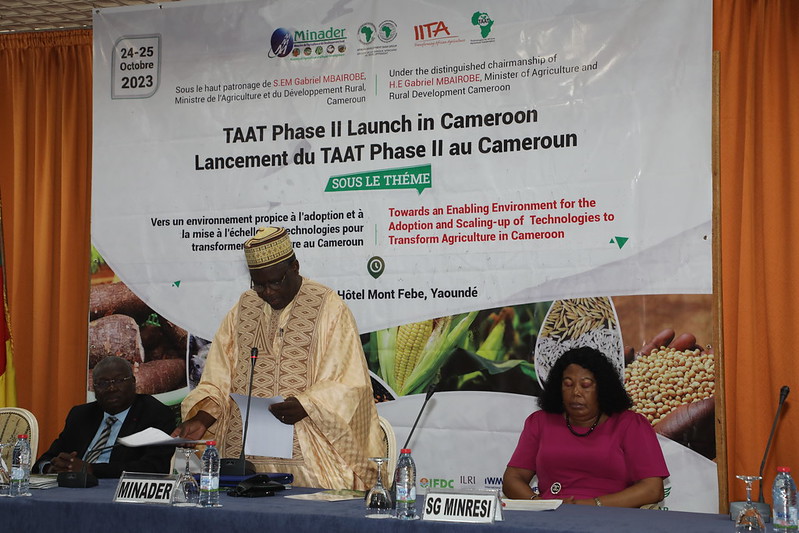
The Technologies for African Agricultural Transformation (TAAT) has launched the second phase of its activities in Cameroon. The launch, which held from the 24th to 25th of October 2023 at HOTEL MONT FEBE in Yaounde, brought together key stakeholders to elaborate a common strategy for adopting and scaling available technologies to double productivity in the country and the sub-region.
H.E Gabriel Mbairobe, the minister of Agriculture and Rural Development of Cameroon in his opening remarks lauded the the launch of TAAT phase II activities in the country covering rice, cassava, maize, high iron beans, soybean and fish.
According to him, the joint-launch event will strengthen the institutional framework and environment to support the implementation of TAAT activities in the country. “It will further strengthen quality assurance mechanisms, increase the participation of national stakeholders in the activities of TAAT and develop with all stakeholders, a road map for the implementation of the TAAT activities in the country,” Hon Mabairobe added.
According to Dr Chrysantus Akem, the TAAT Programme Coordinator, “this TAAT Phase II launch in Cameroon represents a direct response to the need to hold a more comprehensive audience consultation to identify major challenges, develop solutions and advocate for more investments in Cameroon’s agriculture.”
“This launch event which brought together policymakers, international financial institutions and policymakers, scientists, the private sector and farmer organisations to a roundtable discussion to broker investments for Cameroonian agricultural transformation with quality inputs, particularly seed as a primary entry point, is a step in the right direction,” Dr Akem added.
Dr Solomon Gizaw, the Head of TAAT Clearinghouse in his presentation noted that TAAT, being a consortium of 13 International Agricultural Research Institutions and the National Agricultural Research Systems (NARS), brings a wide range of solutions to the major challenges militating against the growth of the agricultural sector in Cameroon.
The TAAT Phase II activities, according to him, “will elevate the voices of value chain actors impacted by the cassava, maize, fisheries, soybean, high iron beans and rice seed system by sharing success stories from the global south on increasing the availability of climate-adaptive, improved, and disease-free seed to improve farmers’ livelihoods.”
“It will provide the opportunity to share seed development experiences from DRC, Nigeria, Tanzania, Rwanda, Kenya etc,. and TAAT’s value proposition for scaling and replicability to other African countries where fish, high iron beans, soybean, cassava, maize, and rice play significant roles in income generation and food security,” he said.
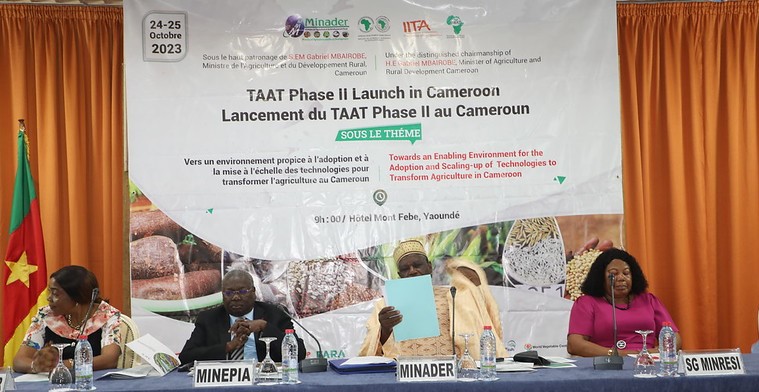
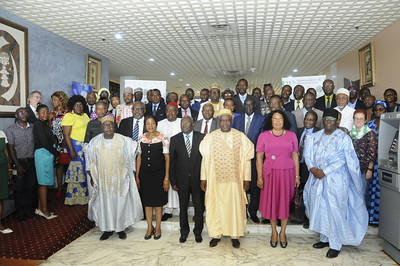
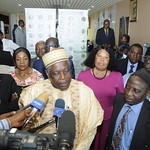
Bringing new technologies to smallholder farmers who are the end users is critical to driving agricultural production in Africa and Cameroon in particular, says Dr Christopher Suh. Dr Suh, who is the TAAT Country Engagement Officer for Central African region stated that “there is urgent need to accelerate the transformation of African agriculture and efficiency along agrifood chains.”
He says though farmers are increasingly using innovative approaches combined with traditional knowledge, there is a need to take the shifts further to boost food production and nutrition quality and build climate resilience.
“In this second phase of the programme, we envisage accelerating the agriculture transformation process. We have all the experts to put their knowledge at the doorsteps of farmers and policymakers,” he said.
The two-day event catalysed the realisation of the Cameroonian Government’s agricultural policy goals through seed sector development, raising awareness on the role of quality seed in agricultural transformation, sharing best practices in building sustainable and robust seed systems and value propositions to achieve the goals of government.
With this successful launch, the TAAT Programme, through six compacts led by the International Institute of Tropical Agriculture (IITA) African Agricultural Technology Foundation (AATF), Alliance of Bioversity-CIAT (ABC), the WorldFish Centre and the AfricaRice Centre, has formally began work on charting the path for seed sector development guided by a seed roadmap that will boost the supply of quality seeds of climate-resilient and market-preferred varieties to respond to the growing needs for food and industry in Cameroon and advocate for more investments in sustainable food production systems for economic prosperity, including job creation and access to nutritious foods.
Recent Stories
Related Stories
- Unlocking Agricultural Potential: Cameroon Develops Seed Roadmap for Sustainable Growth
- COTE D’IVOIRE: TAAT and Partners convene stakeholders for a seed roadmap
- TAAT facilitates seed roadmap to boost agricultural productivity in Benin
- Seed System: TAAT rallies Stakeholders for a Seed Roadmap for Benin
- BENIN: TAAT and partners convene stakeholders for a seed roadmap


